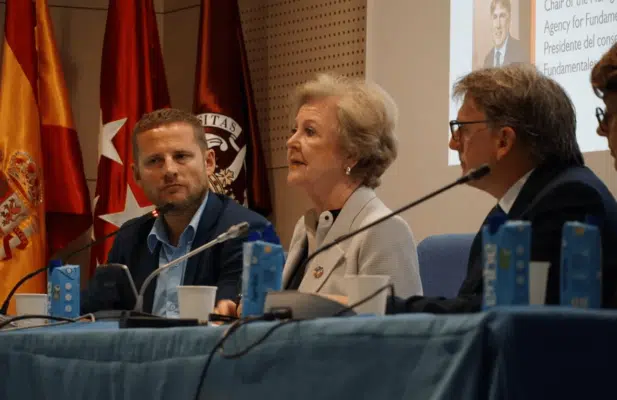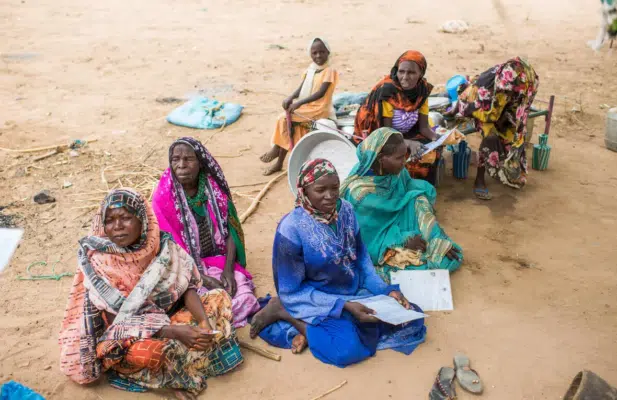Thank you very much, Yvonne, and good afternoon. It is a great pleasure to be here.
I am truly delighted that UNHCR is co-sponsoring this Global Summit on Gender Equality in Nationality Laws, along with the Global Campaign for Equal Nationality Rights, UNICEF and UN Women.
At the core of the Universal Declaration of Human Rights is the basic premise that all human beings are born free and equal in dignity and rights. Equality is the bedrock principle on which our entire system of human rights is based, and on which the very health and functioning of our societies depend.
This legal and moral imperative to treat everyone equally also extends – it must extend – to nationality rights.
Eleanor Roosevelt – the Chairperson of the UN drafting committee of the Universal Declaration – referred to the right to nationality as a right of vital importance. She was right. It is fundamental to one’s identity and to the enjoyment of other human rights. Yet, this right to nationality is, as we just heard, denied to millions around the world, leaving them at risk of being marginalized and vulnerable, without access to basic services, or the ability to seize opportunities to build a decent life for themselves.
Inequality between men and women in nationality laws is a major cause of statelessness – and this is why UNHCR has a big stake in this discussion as statelessness is, as you know, an issue that UNHCR has been mandated to resolve. It has profound impacts on the lives of women, men, girls and boys around the world today.
Women’s inability to equally confer citizenship can put huge financial, emotional, and practical strains on families, as you know very well. Its impacts are often passed down from generation to generation. Discriminatory nationality laws can threaten family unity, and in some cases, increase the potential for family violence, and even if I may go to the other part of our own work, lead to forced displacement.
To better understand the human suffering behind this discrimination, here are some real-life examples of the impact of gender discrimination in nationality laws:
- A 70 year-old widow who is still working three cleaning jobs to support her adult children. As she was not able to confer nationality, her children are stateless and unable to find employment.
- A 10 year-old boy, picking rubbish at a dump because without a father or access to his mother’s nationality he lacks the documentation, for example, to go to school.
- A 46 year-old divorced woman fighting a losing battle against her abusive husband in order to see her three children who live with him in another country because they only have his nationality, not hers.
And there are many stories like that all over the world.
I am really grateful that you have invited Habiba, Gaithiri and Neha who will tell us how their lives and the lives of their children and families have been impacted by gender discriminatory laws.
I admire the courage, tenacity, and resolve that have brought you here today (and that motivate so many activists and practitioners around the world). We don’t take it lightly that you have chosen to share your personal experiences, and your demands, with us.
In 2014 as you know, UNHCR launched the ambitious IBelong Campaign to End Statelessness. Critical to achieving the goal of ending statelessness is the universal reform of nationality laws that discriminate against women. This goal reflects the objectives of Article 9 of the Convention on the Elimination of Discrimination Against Women which explicitly calls on its State Parties to ensure that women have the same rights as men when it comes to their ability to confer nationality to their children and spouses.
But gender inequality in nationality laws is not only about women’s rights. It is also about children’s rights. In fact, the Convention on the Rights of the Child, ratified by almost every country in the world, stipulates that “every child has the right to acquire a nationality”. Complying with this obligation requires that states reform nationality laws that prevent mothers from passing their nationality to their children.
This is why I am heartened that the Global Campaign on Equal Nationality Rights, UNICEF and UN Women are standing with us – shoulder to shoulder – as ending gender discrimination in nationality laws requires our collective and undivided attention and action. For upholding equality makes our societies better, stronger and more inclusive. When women can confer their nationality equally with men, their children are more likely to receive an education, healthcare and access to the formal labour market once they grow up. Ending gender discrimination in nationality laws also brings us all closer towards realizing the Sustainable Development Goals, in particular the Goals relating to Gender Equality (Goal 5); Reducing Inequalities (10); and Peace and Justice (16).
I am convinced that by working together we can overcome this remnant of enduring gender inequality.
We have seen inspiring progress over the years in eliminating this particular form of discrimination, showing us all that where there is political will, it can be done.
Today we will hear from three countries, Indonesia, Liberia and Morocco, which exemplify how such reforms can come to fruition. They remind us that reform is possible in any part of the world, regardless of differences in language, culture or religion. I welcome Minister Saydee-Tar who will speak to us today about Liberia’s journey; from the pledge it made at the 2019 Global Refugee Forum to remove gender discrimination in its nationality laws (I remember very well and discussed it when I was in Liberia last year), to the Constitutional reform it achieved in this area last year.
I am thrilled that today we will also hear from States that are on their journey towards reform. Minister Buthelezi from Eswatini, Major General Al-Khafaji from Iraq, and Secretary Namakin from Kiribati: thank you for coming to share news about the progress your respective countries are making, and please be assured of UNHCR’s support for efforts in each of your countries, as well as in other countries.
Across the world, civil society, and (increasingly) organizations led by those affected by gender discrimination in nationality laws, are indispensable advocates and partners in our collective efforts to achieve universal equality. A number of them have travelled to attend this Global Summit today. Thank you for being here.
This year we celebrate the 75th anniversary of the Universal Declaration of Human Rights. We are, as I said, in the final two years of the IBelong Campaign and we are entering the final stretch to achieve the SDGs by 2030. Now is the time for us all to take action, including by helping the remaining countries achieve gender equality in their nationality laws.
I propose five key actions for Governments to take:
- First, all States that are yet to do so, should accede to the Convention on the Elimination of All Forms of Discrimination Against Women and to the 1954 and 1961 Statelessness Conventions. These accessions are not just abstract diplomatic gestures, but provide legal basis for national reforms to ensure gender equality in nationality laws and to prevent and reduce statelessness and to protect stateless people.
- Second, States that are already party to CEDAW should remove any reservations that they have against Article 9. This would be in keeping with the object and purpose of that treaty and facilitate the reform of gender discriminatory nationality laws.
- Third, States which still have this aspect of gender discrimination in their laws should consider making a pledge to reform their nationality laws at the Global Refugee Forum (GRF) in December this year. The GRF is about refugees, asylum, responsibility and burden sharing in refugee matters, but given also the close link between statelessness and displacement, it is relevant that these pledges take place, as was the case in 2019.
- Fourth, States that have already pledged or committed to reform their laws should develop a time-bound implementation plan to reform these laws…and then implement them!
- And finally, States that have had the experience and have seen the benefits of introducing gender equal nationality laws should support through dialogue and sharing of their own positive practices with those that are yet to achieve these reforms.
Change requires action not only from States. We need the continued leadership shown by regional organizations and by parliamentarians. I ask them to continue acting as bridges among States together with civil society and as facilitators that reconcile diverse positions towards ensuring this aspect of the respect for gender equality. And we will also require greater support from the whole UN system (and ask my UN colleagues here to help us), as well as NGOs and others working in this field.
To support such a collaborative way of working, UNHCR is currently leading an effort to establish a new multi-stakeholder Global Alliance to End Statelessness. We will launch this global alliance in 2024, at the end of the IBelong Campaign to carry it forward and build on it. This initiative will expand the level of engagement of global, regional and national stakeholders, including States and stateless-led organizations. As part of this, we will work even more closely with those countries that have unequal nationality laws to help them achieve the reforms that are needed.
Like statelessness, the problem of gender discrimination in nationality laws has a cure that is within our grasp. Collectively, let us rise to this challenge, do what it takes to achieve universal equality between women and men in nationality matters and consign this form of discrimination, once and for all, to the history books.
Many thanks.
Originally published by UNHCR on 13 June 2023.





